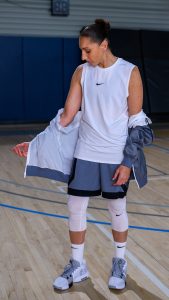- Slug: Sports-Diana Taurasi Eczema, 980 words
- 2 photos available.
By Joshua Heron
Cronkite News
PHOENIX – Before Diana Taurasi walked onto the court in the 2009 WNBA Finals, she elected to wear an arm sleeve. The world saw her rally the Phoenix Mercury back from a 2-1 series deficit to beat the Indiana Fever 3-2, average 20.4 points en route to her first finals MVP, and hoist the capped trophy, looking at it with great adoration.
But the world couldn’t see what was underneath her arm sleeve. It wasn’t an additional accessory, extra support or for compression; instead, Taurasi was hiding her moderate-to-severe eczema.
Eczema is the name for a group of inflammatory skin conditions that cause itchiness, dry skin, rashes, scaly patches, blisters and skin infections and can range from mild to severe, according to the National Eczema Association.
Fifteen years later, the WNBA’s all-time points leader is publically sharing details about her journey with the condition for the first time.
“So many times eczema dictated how I felt (physically), especially on the court,” Taurasi told Cronkite News. “I remember being in the 2009 WNBA Finals and having an outbreak, and I wore sleeves to ensure I felt comfortable.”
Severe eczema may include periods of flare-ups that can last many days or even several weeks, according to the National Eczema Association. The association adds that severe eczema comes with additional complications beyond itchy skin and rashes and can lead to hospitalization if left untreated.
Taurasi was diagnosed with moderate-to-severe eczema in high school, but the outbreaks worsened when the Los Angeles native attended the University of Connecticut due to the shift in weather.
“When you live with eczema, you are always worried about an outbreak, the weather, what your next activity will be,” Taurasi said. “All those things dominate your daily life.”
Taurasi went to bed at night hoping to wake up with clear skin on her arms and back, which were primarily affected. She tirelessly applied a myriad of substances to help her condition.
“I’ve been dealing with this pretty much my whole life, and using different topical creams, lotions, potions, steroids, to try to get it under control was always the biggest challenge for me,” Taurasi said. “Having itchy red skin, especially when you are playing a sport where you are wearing a jersey and your arms are always out, I felt a bit vulnerable.”
Eager to overcome eczema, Taurasi sat down with her dermatologist last year to decide on treatments. The doctor recommended Dupixent, or Dupilumab, a biologic treatment for people ages 6 months and older with uncontrolled moderate-to-severe eczema. The five-time Olympic gold medalist’s condition improved after incorporating Dupixent into her weekly routine.
“Being uncomfortable for so long with the itchiness and redness, it’s (Dupixent) given me back a little bit of my autonomy,” Taurasi said. “It lessened all my outbreaks, so it’s really changed my daily life.”
Taurasi is partnering with pharmaceuticals Sanofi and Regeneron to raise awareness about the everyday challenges people with moderate-to-severe eczema face. The partnership launched Monday.
“I’ve been lucky enough to partner up with Sanofi and Regeneron to share my story and the things that I’ve been through,” Taurasi said.
The pharmaceutical brands and Taurasi uphold the same mission to impact some of the 2.7 million people in the U.S. aged 6 months and older battling uncontrolled moderate-to-severe eczema.
Dr. Annabelle Garcia, a San Antonio board-certified dermatologist, believes Taurasi publicizing her journey with eczema will encourage others battling the condition.
“Diana’s story can give hope to others who may be going through similar challenges with moderate-to-severe eczema and help them realize they are not alone,” Garcia said.
On days when the eczema withered away her self-confidence, Taurasi leaned on her community.
“My family dealt with it just like I did, especially when I was really down, and I didn’t even want to leave the house,” Taurasi said. “I really relied on my family and friends.”
Arizona State University student Mia Berry has dealt with eczema since infancy. Similar to Taurasi, a supportive community comforted her.
“When you have eczema, and you feel a little self-conscious about it, (when there is) someone to tell you, ‘Hey it’s not that bad,’ it makes you feel like OK,” Berry said. “My mom was among the first to tell me, ‘Even with these rashes on your skin, you’re still beautiful. Don’t let insecurity overtake that and take away your confidence.’”
Taurasi sometimes internalized and struggled with people’s response to her condition.
“It’s (eczema) something that when you see it’s still shocking for people, so having to really navigate the reactions of other people was some of the toughest moments,” Taurasi said.
As Taurasi aged, she developed better coping skills for more challenging days. However, the former first-round pick knows that young people dealing with eczema, especially girls, take pride in their appearance but urged them to advocate for themselves.
“There are treatments, and there is a solution,” Taurasi said. “I know when you are young, you lean on your appearance so much, but make sure you sit down with your dermatologist, go to showupad.com and hear these stories (of people with eczema). There is help out there.”
Garcia added that wearing loose-fit clothing, bringing umbrellas to the beach and keeping your screen moisturized are some of the various methods one can use to manage eczema.
With clearer skin, Taurasi can now do things she enjoys, including going to the beach or the pool without worrying about a flare-up.
To Taurasi, eczema is a “lifelong journey and struggle” but she used the condition as mental fuel for her career. Since symptoms began in high school, her resume includes three collegiate national championships, a WNBA Rookie of the Year award, three WNBA titles and 10 WNBA All-Star appearances, to name a few.
“I think it (eczema) made me focus even more,” Taurasi said. “To distract myself from my skin and being uncomfortable, I would actually dive into being even more focused and even more competitive.”
For more stories from Cronkite News, visit cronkitenews.azpbs.org.

